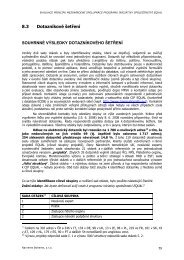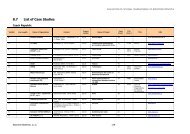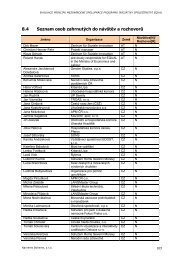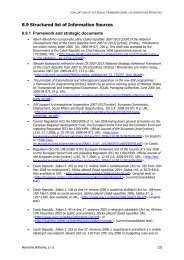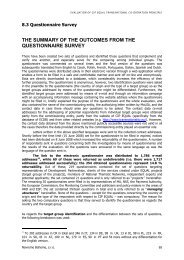EQUAL - Final report - eng - navreme
EQUAL - Final report - eng - navreme
EQUAL - Final report - eng - navreme
You also want an ePaper? Increase the reach of your titles
YUMPU automatically turns print PDFs into web optimized ePapers that Google loves.
1. EXECUTIVE SUMMARY<br />
EVALUATION OF CIP <strong>EQUAL</strong> TRANSNATIONAL CO-OPERATION PRINCIPLE<br />
The transnational cooperation was an obligatory part of the Community Initiative Programme <strong>EQUAL</strong><br />
and a number of the participating organisations would not have included it in their projects on their<br />
own. However, the evaluation has proved that the participating bodies in absolute majority have<br />
gradually begun to perceive it as a component part of the programme and often, in spite of the initial<br />
disbelief and low expectations, they evaluate it as a very valuable and unexpectedly rewarding<br />
part. In a wide scale of particular results and outputs it is possible to find a common denominator: it<br />
is widening of the views, or in general “the experience“, widening of the context of thinking,<br />
perception, attitudes, behaviour, solutions etc.<br />
The most significant factors influencing efficiency and success of the transnational cooperation seem<br />
to be, according to the evaluation, compliance, as the case may be sharing the project<br />
objectives among partners, selection of a partner and partially the innovation rate of a<br />
particular project. Above all, thanks to this fact the preparatory and the initial stages of the<br />
project, which consequently have the principal impact on the whole implementation, seem to be as<br />
essential for the success of the transnational partnership. In this respect, also the cooperation with<br />
the managing authority and the quality of its support is mentioned as the key factors, too.<br />
In the course of the whole evaluation it also showed up that the Community Initiative Programme<br />
<strong>EQUAL</strong> had impacted in a specific context in the Czech Republic and it had interfered with it quite<br />
significantly. Without the framework understanding of this context it is neither possible to interpret<br />
the results nor to understand the findings. The following aspects of more general framework of<br />
the programme effects have shown up as the most substantial:<br />
• Wider experience from implementation of similar programmes was missing on all parts –<br />
managing and support structures, recipients (organisations; partnerships), clients; the<br />
programme brings not only new methods of work, but it also sets a different climate as a<br />
whole thanks to the volume of means that are disposed of. Above all, the suite of the “europrofessionals”<br />
- people, who have an idea, in a better case even direct experience in work<br />
within the EU context, who have the necessary personality and knowledge qualifications, who<br />
have adequate language knowledge, etc. - is only coming into existence. This is valid more<br />
noticeably on the part of the managing structure.<br />
• Non-profit organisations in the Czech Republic are still unstable altogether as regards the<br />
sources of financing insomuch that the overwhelming majority of them practice the crisis<br />
management permanently instead of the strategic management. Reserves, own free sources<br />
that would not be spent in the operation and, above all prospect of any more stable financing<br />
with a more long-term perspective are missing completely. The situation is different in<br />
the implementation agencies that came into existence without their own mission for the<br />
purpose of “implementation” of the European projects and do not follow wider objectives or<br />
topics – these do not need to “feed” from the projects the operation of the insufficiently<br />
financed non-profit organisations and the administrative demands do not burden them<br />
excessively – account of them has been taken since the beginning (it means the funds for a<br />
coordinator’s and administrator’s salary are really used in this way and it is not necessary to<br />
pay from them normal employees of the organisation, who shall then “administer” the project<br />
somehow aside – in addition to their normal duties).<br />
• A tradition of formally negotiated partnerships that are not agreed on the basis of personal<br />
relations but on the basis of explicitly formulated objectives, clearly divided roles, rules<br />
stipulated in advance and open communication are missing. This relates both to transnational<br />
and national partnerships.<br />
The comparison among the Czech Republic and the other EU countries included in the evaluation is<br />
interesting, above all because it has not been possible to trace any considerable difference in the<br />
respondents’ reactions to the same questions and themes; however, it is possible to trace the<br />
differences in comparable extent of cases, namely the substantial ones. The individual partial<br />
differences may be followed best in the results of the questionnaire investigation; however, it may be<br />
stated in general that the differences resulting from “maturity” and “immaturity” are concerned –<br />
namely both in good and bad meaning. Maturity and self-confidence of the senior EU Member States<br />
Navreme Boheme, s.r.o. 9



